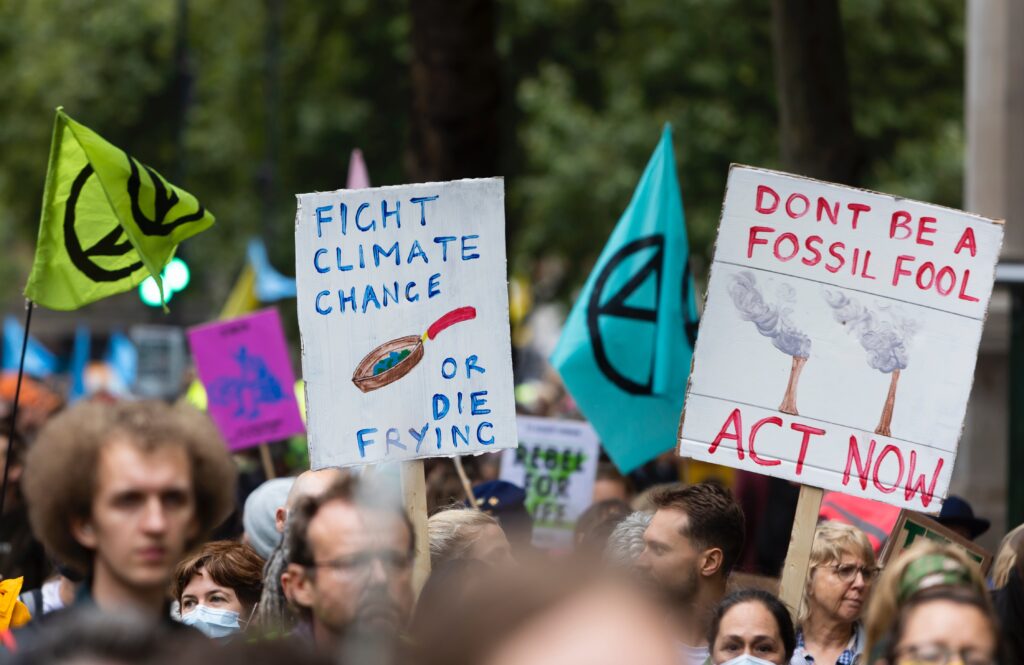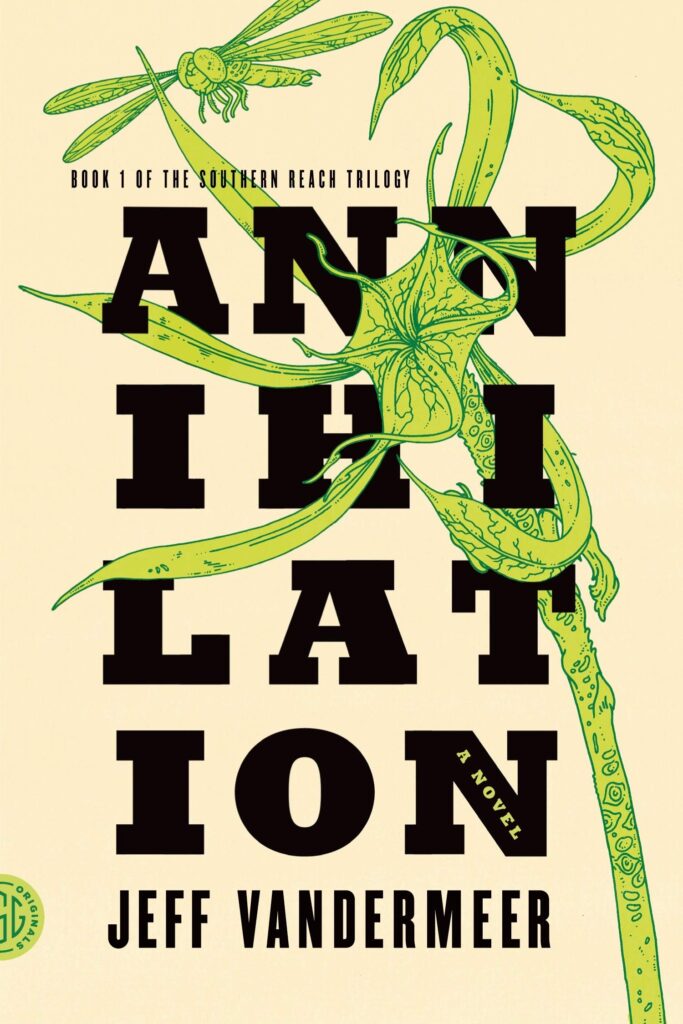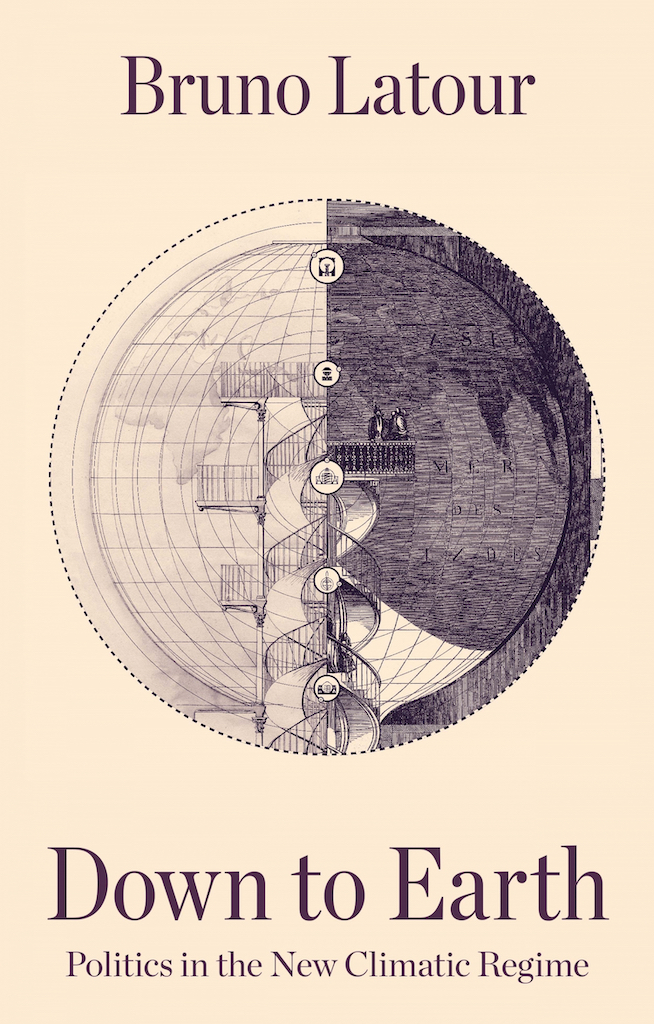In the fight for climate justice, awareness is the beginning. For Earth Hour 2023, we recommend five fiction and non-fiction titles to understand the climate crisis and live in the Anthropocene

Young people protesting for climate change. Free-to-use photo supplied by Centre for Ageing Better.
Every era is marked by changes that define it through history. For the Earth, it all started with the Hadean, a geological eon commenced over four billion years ago as the planet formed. The hardening of its crust triggered the new time of the Archean; the Proterozoic brought about the first living organisms and slowly oxygenated the atmosphere. The most recent eon, the Phanerozoic, saw the wide emergence of complex life forms of animals and plants up to the era of the Holocene, when human history began.
But as human indomitable activity, colonial exploitation and capitalist greed damaged the world irreversibly, the need to declare a clear-cut epoch arose among scholars. We are now children of the Anthropocene.
Amid global climate activism, also literature responded. Essayists adjusted their monocles to assess the emergency and study possible pathways to change; poets and creative writers drew on the alterations yielded by the crisis and fed their imagery with dystopian dimensions through the burgeoning literary wave of climate fiction – or cli-fi.
Cli-fi, academics estimated, could even positively affect our behaviour. “Readerly engagement with evocations of a world irretrievably disrupted by climate change, ecological damage and species loss constitutes a rich and generative way that people are learning to understand and live with climate crisis [which] may constitute a step towards fighting for climate and environmental justice,” said Dr Miranda Iossifidis, lecturer of sociology at Newcastle University, who worked on a paper that investigated the effects of cli-fi.
Heat waves, wildfires, droughts and floods have been the symptoms of a depleting disease that we all gradually became aware of, but that decision-makers often wilfully overlooked.
Last year was declared U.K.’s hottest on record and the fifth worldwide, with temperatures exceeding 40C, as a damning report released by the United Nations’ Intergovernmental Panel on Climate Change in March 2023 issued a final warning to act before it is too late.
Rising temperatures and severe climate conditions lead millions to fall into penury. The World Bank, a financial institution that provides capital for international development, suggested that a staggering 26 million people are annually forced into poverty due to extreme weather.
“Storms, floods, and droughts have dire human and economic consequences, with poor people often paying the heaviest price,” said Jim Yong Kim, former president of the World Bank, in a statement published by the partnership.
Among the initiatives to spur a modest change, the WWF started a symbolic flash-mob in 2007 to shed light on climate change with a brief collective action. Earth Hour, the movement’s name, annually asks to take part in a mass effort to turn off electrical devices for just an hour, usually between 8:30pm and 9:30pm, on the last Saturday of March.
Over the years, Earth Hour soon achieved global, impressive milestones becoming the world’s largest grassroots group for the environment by 2009.
“Electricity savings are important because they demonstrate the potential role played by [people’s] behaviour,” said Dr Alan Meier, senior scientist at Lawrence Berkeley National Laboratory who co-authored a comparative analysis of the electricity impacts of the movement.
Some of the revolutionary attitude we are capable of, though, often starts with awareness. This is why we decided to review five fiction and non-fiction books that delve into this precarious time from different perspectives ahead of the next Earth Hour on 25 March.
‘Annihilation’ by Jeff VanderMeer

In this fictional novel on the effects of climate change, ‘Area X’ is a zone where an environmental cataclysm has engendered an ecosystem that might now perilously contaminate our world and transform it irredeemably.
Several previous expeditions of the fictitious governmental agency ‘Southern Reach’ into the area failed: some researchers committed mass suicide; others killed each other.
The latest attempt is made by the main characters of this book: four women, whose names are given by their professions (surveyor, anthropologist, psychologist and biologist). The biologist, who acts as narrator in the story, will take the reader through the horrifying, Lovecraftian world where nature takes its revenge.
But the madness of this unstable territory made of malformed creatures and slimy paths will try “to colonize you: from the outside in, forcing you to live in its reality,” VanderMeer writes. Here lies the parallelism with climate change: confrontation becomes pivotal to avoid that what is confined in this eerie space reaches us.
‘The Water Knife’ by Paolo Bacigalupi

What if, in a very-near-future, access to water had to be contended in a war between companies? Or, what if “some people had to bleed so other people could drink,” as Bacigalupi suggests? These questions are the starting point of this other trailblazing cli-fi novel.
Angel Velasquez is a felon who is released from prison by Catherine Case, a ruthless business magnate.
She hires him to commit a series of crimes and destroy Arizona’s water supply, managed by a rival firm. For the sake of her profits, Velasquez – the ‘water knife’ – will investigate, spy and kill.
In the background of his endeavours, stifling torridity and parched lands are the grim effects of climate change that, given their daunting realism, will keep you short of breath.
‘Out of Time: Poetry from the Climate Emergency’ edited by Kate Simpson

In this collection, poetry is employed to “ask questions, subvert expectations and raise awareness” on the Anthropocene, writes Kate Simpson in her preface.
The poems are divided chronologically in five sections. ‘Emergency’ is an assessment of the current condition of our planet: “soil, rivers, oceans, seams of hot tar, broken glacier chips and molten yolk.”
Then comes ‘Grief’, where the reader can smell the forest where trees were felled, “ancient and piney, earth’s incense rising.”
The section of ‘Transformation’ marks the beginning of our redemption. We wonder: “what would the trees say about us? […] if they had to cut us down?” ‘Work’ and ‘Rewilding’ close the collection with a hopeful optimism: after correction, we realise “it is worth living, just to hold it.”
From each sale, 50p will be donated to Friends of the Earth, the UK’s largest grassroots environmental campaigning organisation, in celebration of their 50th anniversary.
And for the non-fiction fans…
‘The Uninhabitable Earth’ by David Wallace-Wells

Building on a New York magazine article that became the publication’s most viewed ever, the editor David Wallace-Wells tells you the truth, just the way it is, on climate change: it is “much worse than you think.”
This non-fiction book is a comprehensive reading of annals of climate denialist inactivity and the effects this produced and might generate in the future.
But if you ever wonder of acclimatising to statistics, outspoken facts will shake you out and remind you of the importance of immediate change.
This era will be marked by harrowing circumstances. Paraphrasing his words, ice sheets will start collapsing, global G.D.P. per capita will be cut by 13 percent, 400 million more people will experience water scarcity, major cities in the equatorial band of the planet will become unliveable, and heat waves will kill thousands each summer.
Yet, despite the gloomy predictions, action can still “bring a happy ending,” the author writes. A green energy transition, taxes on carbon emissions, as well as processes of carbon capture and underground storage can make for effective steps to prevent even worse scenarios.
‘Down to Earth’ by Bruno Latour

Politics is responsible for change. But how politics can change things remains a mystery.
For the late philosopher, who thoroughly studied the relation between politics, technology and science, the twentieth century has been defined by parallel counterparts: left and right; local and global. These, Latour argues in this essay, only led to an inefficacious position which is out-of-this-world and of static unawareness.
Through a decolonial approach, that focuses on nature rather than the individual, the intellectual offers ways to take the good of both poles and tackle the major issues of our zeitgeist. Rising inequality, mass migrations and climate change have progressively destroyed our soils; the paucity of a land where to live consequently turned all of us into ‘climate refugees’, the author says.
All nations should be protected from global hierarchies. Instead, an international orientation that is common to every state should be followed.
*
We suggest buying these books second-hand and from a physical store. However, links used throughout the article will drive you to environmentally friendly websites.
